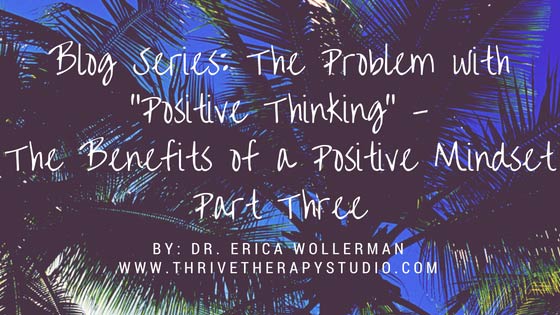The Problem with Positive Thinking – Benefits of a Positive Mindset (Part 3)

So, as you probably noticed in my first blog in this series, I have a lot of concerns with positive thinking and its’ attempts to tell us not to feel our unpleasant emotions or think our unpleasant thoughts. However, there are parts of “positive thinking” that I think are truly helpful and worth mentioning here and are traits of someone with resilience and more of a positive mindset. Check out the first two blogs in this series here and here!
1. Focusing more on gratitude
In my eyes, focusing on gratitude and intentionally seeking ways to show or experience gratitude is so important. We can often become habitual problem finders who just focus on problems or challenges, rather than all we do have to feel grateful for. In contrast to positive thinking though, I mention gratitude more as a daily practice or habit and not a response to feeling something unpleasant. Generally trying to cultivate a mindset of gratitude looks like noticing things you are grateful for at the end of a day or week – NOT trying to focus on gratitude in moments where you are really upset or struggling. That would be just like the whole, “think positive” suggestion and likely only make you feel worse.
2. Confidence that you can manage difficult situations, experiences, struggles
I believe that having a positive mindset about your life could include the confidence that you are going to be okay. That yes, life has its’ struggles, but they really do make us stronger and lead us in new and different directions which can be exciting and scary. In order to have this perspective, you have to not only remember struggles you have had, but remember that you got through them and that there were lessons learned along the way. This part of having a positive mindset involves allowing yourself to remember and process your challenges, not to feel worse about them, but to see what you have endured and how resilient you are. Yes, difficult things are going to happen. But yes, you can get through it.
3. Cultivating memories of pleasant moments, experiences, even during times of struggle
This is so incredibly difficult, but so important. We need to remember that all emotions are temporary, the pleasant and the unpleasant. As such, even when we are in deep pain and struggle, we need to have the deeper knowledge that we will not always feel this way.
For example, when you are grieving a loss, perhaps of a relationship, pet, loved one, life path, etc. it is important to know that grief marks the importance of that relationship in your life. That when we love, because everything is temporary, we will know loss and need to feel that loss because our feelings and grief honors the relationship or experience.
Hopefully this blog rounds out our series on Positive Thinking! While I am not a positive thinking proponent, there are definitely some assets of learning to cultivate a positive mindset and work on becoming a realistic thinker.
At Thrive, we take a positive, client centered approach to therapy that is focused on creating a genuine connection with our clients. If you would like to talk with a Thrive Therapist about yourself, your child, or teen attending therapy, please reach out to us by phone at (858) 342-1304.
As always, thanks for reading and comments are always welcome regarding any issues around child or teen psychotherapy services in San Diego by Thrive Therapy Studio.
To stay in the loop on the services offered and to receive updated information about Thrive, please feel free to sign up for the newsletter through the following link: http://eepurl.com/cvGx5n.
Reach out to start
your healing journey

